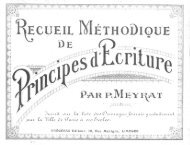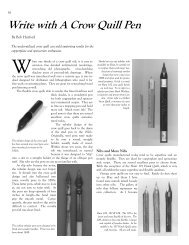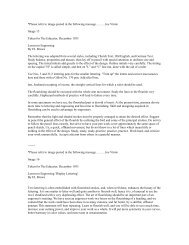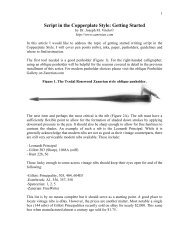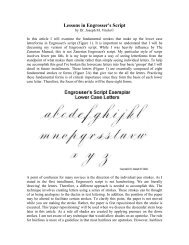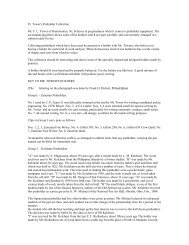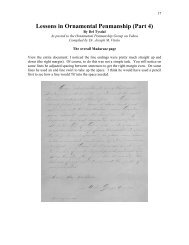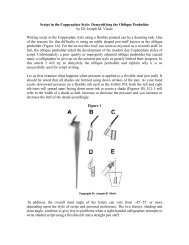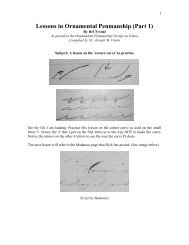The Educator (Volume 45) - IAMPETH
The Educator (Volume 45) - IAMPETH
The Educator (Volume 45) - IAMPETH
Create successful ePaper yourself
Turn your PDF publications into a flip-book with our unique Google optimized e-Paper software.
"Children's interests are what we<br />
malce them" is the final decision from<br />
scientific study according to the Seattle<br />
Education Bulletin. Interest, in<br />
other words, grows out of the environment<br />
in which the child finds<br />
himself. Our responsibility is that<br />
of seeing that the child gets the best<br />
environment possible."<br />
Just one example of another type<br />
of difficulty children encounter on<br />
their first day at school. A little girl<br />
had returned home at noon for lunch<br />
after her first morning at school and<br />
was asked how she liked it and what<br />
had happened, to which she said that<br />
it was all right but she wanted to<br />
hurry back to get her present. Upon<br />
being questioned further, the child<br />
told them that the teacher had told<br />
her "to sit here for the present."<br />
But in spite of such drab surroundings,<br />
children do manage to make the<br />
best of it, frequently on account of<br />
the enthusiasm of the teacher.<br />
Surroundings<br />
And now consider the relation of<br />
your teaching in such surroundings.<br />
<strong>The</strong> cities have done much to overcome<br />
such situations, I grant, but<br />
there are too many children not cared<br />
for.<br />
Certainly the Language Arts are<br />
for means of communication—we<br />
should all be the bearers of good<br />
news. Language itself is but a system<br />
of verbal signs but when we consider<br />
these signs as written some,<br />
especially by master penmen in earlier<br />
days, we are aware what can be accomplished<br />
under even the worst conditions.<br />
Let us now picture a typical room<br />
of the best type for developing the<br />
English work and all that it implies.<br />
Picture the room lined with the<br />
best books beautifully bound and illustrated;<br />
pictures adorn the walls;<br />
easels are in the room for drawing<br />
or expressing ideas in color; wi'iting<br />
materials are there for those who<br />
wish to preserve their thoughts or<br />
for other reasons. <strong>The</strong> walls are<br />
tinted and a feeling of satisfaction<br />
comes over one as he steps into the<br />
room. People the room, and we find<br />
in one corner a group quietly conversing;<br />
in another corner, we see a<br />
group consulting books on particular<br />
subjects; in another group, we find a<br />
child reading aloud to others; and<br />
still others are being guided in their<br />
tasks by persons who once were called<br />
teachers.<br />
To most of you perhaps this is not<br />
new, but to others it is still but an<br />
idol dream. Children have been<br />
taught for so long to follow the<br />
teacher's dictates that they know not<br />
how to help themselves.<br />
Some Reactions<br />
I would like to give a few points<br />
here which I discovered along this<br />
line by asking my students who are<br />
taking the course for teachers in<br />
writing. I was anxious to know just<br />
how much their previous training in<br />
writing meant to them since leaving<br />
the grades and high school.<br />
<strong>The</strong> <strong>Educator</strong> 17<br />
I asked them to write down what<br />
was the most outstanding thing that<br />
they now remembered of their earlier<br />
work in writing. <strong>The</strong>se are their reactions<br />
by individual students: "Neatness<br />
was stressed in all wi-iting and<br />
spelling", "Compositions were recopied<br />
in best handwTitmg", "Good<br />
position was stressed", "Close mouths<br />
of 'a's' and 'o's' ".<br />
Exercises in writing: 1. "Ovals<br />
and push pulls made—were called<br />
'train smoke' and 'fences' respectively<br />
with no idea why they had to make<br />
them. This occurred through the first<br />
three grades." 2. "Disliked the exercises<br />
which led up to writing." Z.<br />
"Hated to do them." 4. "Seemed to<br />
practice exercises forever."<br />
Periods: (Wide variation seen) 1.<br />
"Last pei'iod in the day." 2. "Period<br />
at a time of day when I wanted to<br />
get through." 3. "Period nothing but<br />
a bore. All disliked it very much."<br />
4. "Period uninteresting. Too long<br />
and wrote the same material too<br />
long." 5. "Period always came I'ight<br />
after lunch or recess and dreaded it<br />
because we were warm and dirty."<br />
6. "Periods few and far between."<br />
With a little well directed<br />
study and practice anyone<br />
can learn to write well.<br />
7. "Right before noon." 8. "Always<br />
before the last recess." 9. "After recess<br />
and I think it is hard to write<br />
right after you have finished playing."<br />
10. "Period from 10 to 15 minutes<br />
daily." Several gave this answer.<br />
11. "Period once a week, 4.5<br />
minutes."<br />
Copy books: "Had copy books."<br />
Given by several. "<strong>The</strong>y always<br />
looked awful—never saved any." One<br />
student studied the Zaner-Bloser system<br />
and received every certificate<br />
which was awarded for penmanship to<br />
pupils.<br />
Incentives and personal like or dislike:<br />
"Praise acted as a stimulant."<br />
"Paper put on bulletin board." "I<br />
liked to write very much." "Thoroughly<br />
enjoyed the class." "Admired<br />
the teacher's writing and wanted to<br />
write like her." "Wanted class more<br />
often." "Liked writing pretty well."<br />
One won a medal— "liked writing<br />
until in the 5th grade and then grew<br />
careless as had no period for writing."<br />
Had a man supei'visor and it<br />
was "the only time I appreciated<br />
writing when he appeared." One student<br />
was sick for some time in one<br />
grade and the other children wrote<br />
her letters which she has kept. "Used<br />
clay to make letters and numbers. I<br />
disliked it very much." "In a sixth<br />
grade, teacher had children write one<br />
space high and I was chosen as the<br />
best writer—an inspiration to me."<br />
"Never cared for writing. Room was<br />
too dark." "First lesson was to write<br />
name."<br />
Discipline in writing class: "Mouth<br />
slapped when child talked." "Teacher<br />
tapped child's head with pencil." "Use<br />
of a ruler to tap the hands." "A<br />
teacher used a yardstick to spank a<br />
boy and so much dust came from his<br />
trousers, children all laughed and<br />
teacher had to laugh too. At recess<br />
children would chase the boy and try<br />
to hit him to see the dust fly." "One<br />
teacher ate chalk in the 3rd grade.<br />
Children tried eating it and when<br />
they got to 4th grade, they were<br />
punished."<br />
All teachers must be writing conscious<br />
just as "all teachers should<br />
speak the English language contagiously—well."<br />
All boys and girls<br />
must be made %viiting conscious, but<br />
before they become writing conscious<br />
there is a larger task for their<br />
teachers.<br />
As I said in the beginning of the<br />
paper, boys and girls have a vocabulary<br />
of several thousand words at the<br />
age of 4. <strong>The</strong>y have a command of<br />
the English language. <strong>The</strong>y use<br />
compound sentences and gradually<br />
use complex sentences without much<br />
help. <strong>The</strong>y talk, and talk well on<br />
many subjects on their level. <strong>The</strong>n<br />
somewhere along the line they stop.<br />
No more questions are asked. <strong>The</strong>y<br />
have been inhibited so many times<br />
that they finally give up in despair<br />
long before they reach the sixth<br />
grade even and all spontaneity is<br />
lost in high school.<br />
Our business men say the applicants<br />
for positions can't spell, can't<br />
write, and next I am expecting to<br />
hear from them that the applicant<br />
can't read. Some remedial courses in<br />
reading are already formed in high<br />
schools and colleges.<br />
What Can Be Done?<br />
<strong>The</strong> first thing, we'll have to get<br />
the work arranged according to the<br />
child's needs. And by the way, I<br />
just ran across an interesting bit of<br />
news the other day. It seems that<br />
Quintilian who lived from 35 to 95<br />
A.D. discovered individual differences<br />
at that early date.<br />
Since, as McAfee so ably says,<br />
"the ability to read is the key to all<br />
recorded knowledge" and reading<br />
furnishes the mindly only with material<br />
of knowledge, it is "thinking<br />
that makes what is read ours." And<br />
Bason has so wisely said, "Reading<br />
maketh a full man; conference, a<br />
ready man and writing, an exact<br />
man."<br />
<strong>The</strong>refore, we have the Language<br />
Arts—Speech, Reading, and Writing<br />
in the order learned and in the order<br />
which will prove to us if we are<br />
really educated. "A man is judged<br />
by his language." But it is through<br />
his observations and then the interpretation<br />
of such observations that<br />
will lead to action which is the great<br />
end of life just as it is the beginning<br />
of life. "What is put into the first<br />
of life is put into the whole of life."<br />
(Continued on page 28)



